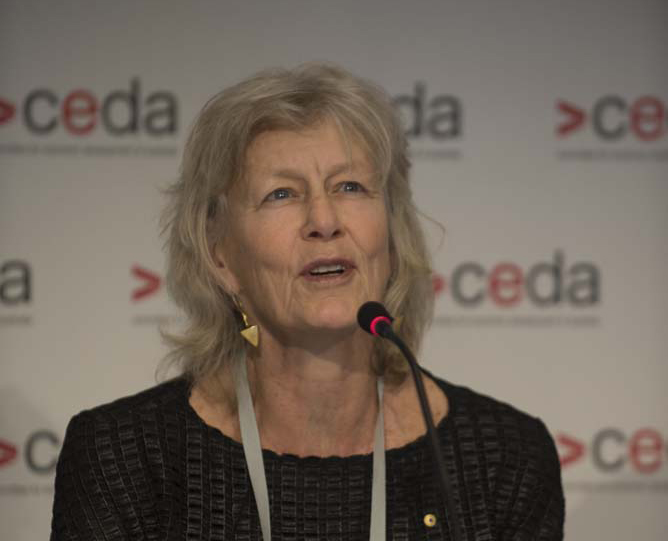PROGRESS 2050: Toward a prosperous future for all Australians
09/10/2016

Session facilitator the Hon. Warwick Smith AM opened the State of the Nation panel session by saying that improving the productivity of a nation is a complex matrix, with four elements to concentrate on: the workplace, education and training, infrastructure and innovation. Mr Smith said if these four areas are concentrated on by policy makers, then we can improve the overall productivity of the nation.
He started the questions by posing whether Australia is pursuing the right investments and building the right infrastructure to export emerging digital industries, stating: “Education is the number three export for Australia now after coal. It is the most sustainable renewable resource.”
Setting the right policies
Clean Energy Finance Chair, Jillian Broadbent AO spoke about the best way to encourage business investment, and whether this was through policy setting or not.
“Policy setting is a necessary but not efficient condition for investment. We have to see the policy settings as being a facilitator, but we can't wait for government to do everything,” she said.
Ms Broadbent said the key to policy setting was the interface between the public and the private sectors. She said there is a tendency by government to see the private sector as self-interested and pushing their own agenda when it comes to policy setting, but it is the private sector that is implementing and taking advantage of policy in the initiatives, therefore they are in a good place to comment.
“Working together you can improve the policy and keep it alive and keep it competitive. The government needs to be flexible with the universities and the private sector when making policies.”
A short-term focus and risk fear
SEEK Chief Executive Officer and Co-Founder, Andrew Bassat said he had “grave concerns when I look around Australian business. I’m genuinely concerned we’re not moving fast enough.
“And there’s not an easy solution because there are a wide range of problems.”
The problems he listed include CEO tenure, shareholders being too short-term focused, and the Australian culture.
“The conversations had in Australia are dramatically different to conversations than those had in Asia and the US. The Australian culture sees failure as a bad thing,” Mr Bassat said.
“You can't innovate and take risks if you don't fail. Boards are very risk adverse. Boards need to take that risk if they are going to do their job properly. The biggest problem is not taking risk.”
Speaking on how to deal with a risk-averse culture, Blackmores Chief Executive Officer and Managing Director, Christine Holgate said, “One of the learnings I’ve experienced is that when change happens or you're trying to push for something like going into China, it can be seen as risky, you have to educate the shareholders and the market.
“You need to set milestones other than financial ones.”
She said to overcome this you need to establish indicators for how a business is tracking when there has been a change that means the business may not be cash positive for several years.
“It’s a matter of making sure you invest for the long term, for whatever happens,” she said.
“For every 10 ideas you have, you will only have one worth investing in. You need to consider covering the costs of the ideas that don't work.”
Export opportunities
Ms Holgate said the opportunities of Asia are “just up the road”, and warned that if Australia doesn’t see the benefits in investing in this region, the opportunities will be taken by European business.
“I haven’t found one business that isn't globally competitive that don't do at least half of their business in exports,” she said.
Watch State of the Nation 2016 videos.
